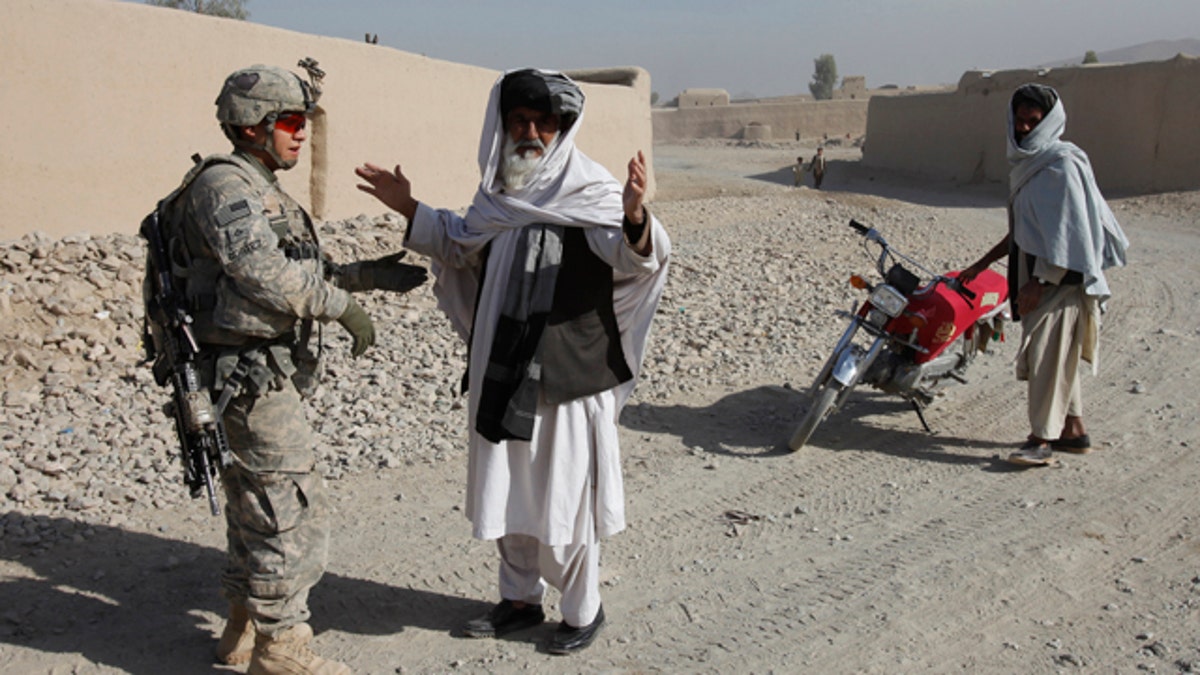
Nov. 21: U.S. Army Pfc. Alexander Cortez, left, of Calif., from First Battalion, 502nd Infantry Regiment, 101st Airborne Division check an Aghan man during a foot patrol in West Now Ruzi village, in Panjwai district, Afghanistan. (AP)
KABUL, Afghanistan – The Taliban on Sunday vowed to force the U.S.-led coalition to abandon Afghanistan before a 2014 date set by the alliance for handing over security responsibility to its allied Afghan forces.
Taliban spokesman Zabihullah Mujahid said in message e-mailed to the media that NATO will be unable to establish a stable government in Afghanistan by that date. He did not mention an offer from President Hamid Karzai for peace talks and eventual reconciliation -- an offer rejected by the hard-line Taliban leadership.
During a weekend summit in Lisbon, Portugal, NATO leaders agreed to begin handing off security responsibility to Afghan security forces in early 2011, with a full transition targeted for the end of 2014. No timetable was set for the gradual transition of Afghanistan's 34 provinces to Afghan control and some foreign troops are expected to remain in a combat role after 2014, although most will be in a training role.
Mujahid said the Taliban "will not remain silent even for a single night until and unless the goal of complete freedom and the formation of an independent government is achieved. They will not wait for the time of implementation of a given decision or timetable of withdrawal."
NATO officials have said in Kabul that the transition will not necessarily mean troops will be withdrawn, but that they could be moved to regions where they are needed.
President Barack Obama has said a decision to withdraw would be conditional on the situation on the ground. In late 2009, Obama had spoken of starting a gradual pullout in July 2011.
Obama last year ordered an additional 30,000 U.S. troops to Afghanistan to regain ground lost to the Taliban in the years after the U.S.-led invasion of the country one month after the Al Qaeda attacks on Sept. 11, 2001. The U.S. has the largest contingent -- about 100,000 troops. Troops from other nations number about 40,000.
"In the past nine years, the invaders could not establish any system of governance in Kabul and they will never be able to do so in future," Mujahid said, adding that until 2014 "various untoward and tragic events and battles will take place as a result of this meaningless, imposed and unwinnable war."
A coalition spokesman in Kabul said the surge in troops helped stop the Taliban's momentum in some regions and turn the tide in others.
"With additional forces and resources, we and our Afghan partners have been able to extend our influence to most key Afghan population centers," German Brig. Gen. Josef Blotz said. "Recent developments have shown that progress is possible. Our job now is to build on that progress to increase the momentum that has been achieved."
There was no mention in the Taliban's message of Karzai's effort to begin peace talks, a step supported by NATO. He recently formed a 70-member High Peace Council to find a political solution to the insurgency. The Taliban have threatened to kill any of their followers who talk to the government.
The Taliban message had a stridently nationalistic tone. The Taliban have recently been portraying the U.S. and NATO as neocolonialist powers occupying Afghanistan for material gain -- an effort to broaden the appeal of the extremist movement. Mujahid for the first time mentioned that the movement had drafted a comprehensive government policy for Afghanistan should they take control.
In fighting around Afghanistan, NATO says international and Afghan forces killed about 20 insurgents -- some of them key Taliban operatives -- in a series of attacks over the weekend. NATO said at least 10 were killed in an airstrike against a Taliban command center in the Kajaki district of Helmand, a southern province where most of the fighting is taking place. Five others were killed in firefights with NATO forces in the district of Sangin. Most of the forces fighting in Sangin are U.S. Marines. Another five were killed elsewhere, NATO said.
In nearby Kandahar province, meanwhile, a bomb blast killed three Afghan civilians in Shah Wali Kot district, NATO said.
